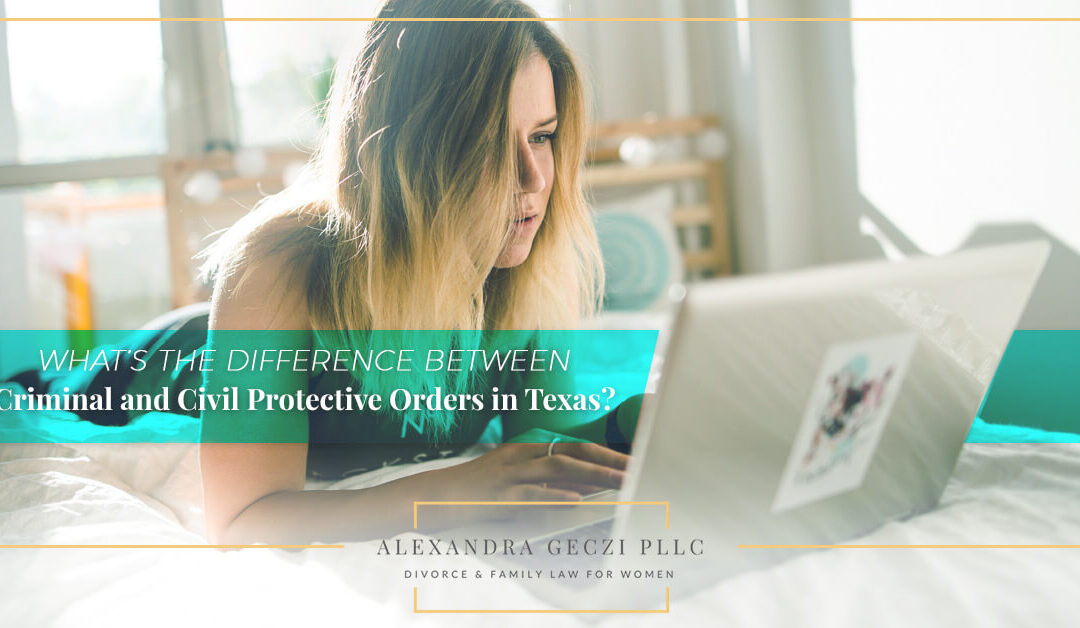When you’re faced with an abusive or threatening situation at home, what are your options? Do you call the police? Do you call a lawyer? Do you stay quiet?
Whatever you do, don’t bury your head in the sand. Speaking up can be one of the hardest things you do, but it can save your life.
When you’re faced with family violence or domestic abuse, consider seeking a protective order. At Alex Geczi, PLLC, we understand that it can be confusing trying to understand how protective orders work. To help, we have written a blog that explains the difference between the various types of protective orders available to you in Dallas and under Texas law.
Two Types of Protective Orders in Texas
Criminal Emergency Protective Order (EPO)
A criminal EPO is from the magistrate court and is pursued by the state attorney or peace officer on your behalf. It is available at the time of arrest for a crime involving family violence, and they can be issued on weekends. If there is a situation that becomes physically violent, then call the police immediately. If the abuser is arrested, then law enforcement can help you with this more immediate type of protective order. Criminal protective orders can last 31 to 91 days. They can also enforce removing the abuser from the home to give you time to collect yourself and get out of the situation. It is important to note that there must be an arrest for this type of protective order to be an option.
Civil Protective Order (PO)
A family court protective order is a little different than a criminal emergency protective order. It does not require an arrest, and it does not need to be immediate. You can apply for a temporary ex parte protective order (TPO) within 30 days following the incident, although sooner is better than later, during normal family court business hours. The TPO is valid for up to 20 days, and then you have to have a hearing on the matter for a final protective order (PO). You can get up to one extension of the TPO. If you prove your facts at the hearing, then you could get a protective order that can last up to two years.
What do you have to prove in order to get a long-term protective order? In short, you must prove three things:
- That the person hurt you or threatened to hurt you
- That you’re afraid they’ll hurt you again
- That you have an intimate family relationship as defined by the Texas Family Code
A TPO/PO can provide the court orders on the following:
- Use of the house
- Child custody and visitation
- Financial support
- Required anger management classes
- Amount of contact, including that the offender must stay away from the house, business, and/or school
- And more
The TPO/PO can also supersede the criminal EPO.
Example of a Protective Order
 Wondering how this all works when put together? Here’s an example: a woman is being abused by her husband. She calls the police. The police arrest the husband. The police or the state attorney pursues an EPO on a Saturday that kicks the husband out of the house for 14 days. In the meantime, the woman contacts and hires a private attorney who advises her to find another place to live. Before the EPO has expired, they go to the family court on a Tuesday and ask for a temporary ex parte protective order that orders the husband to pay her financial support and stay away from her and the kids. The court also sets a hearing within 20 days to determine whether the TPO should be extended for up to two years. The woman may also decide to file for a divorce at any time during this process.
Wondering how this all works when put together? Here’s an example: a woman is being abused by her husband. She calls the police. The police arrest the husband. The police or the state attorney pursues an EPO on a Saturday that kicks the husband out of the house for 14 days. In the meantime, the woman contacts and hires a private attorney who advises her to find another place to live. Before the EPO has expired, they go to the family court on a Tuesday and ask for a temporary ex parte protective order that orders the husband to pay her financial support and stay away from her and the kids. The court also sets a hearing within 20 days to determine whether the TPO should be extended for up to two years. The woman may also decide to file for a divorce at any time during this process.
Divorce and Protective Orders
Lastly, you don’t have to file for a divorce to get a protective order, but they often go hand in hand. If you’ve obtained a protective order within the context of a divorce or other family law case, a finding of family violence can be used to get sole managing conservatorship, alimony, a disproportionate share of the marital estate, and shorten the waiting period to get divorced.
Need a Protective Order in Dallas?
All of this can be confusing, and not all situations require these types of orders. If you’re in an abusive situation, please speak to an experienced family law attorney or divorce lawyer who understands abuse and can guide you to safety.
[bs_button size=”block” type=”info” value=”Contact Us Now” href=”https://www.familylawdfw.com/contact/”]


